
The challenges of caring for a fully-grown, severely autistic adult child are dealt with powerfully, insightfully, and with occasional refreshing bursts of humor in Deanna Jent’s Falling, now getting a Grade-A West Coast Premiere at Rogue Machine Theatre.
 Bill and Tami Martin (Matthew Elkins and Anna Khaja) are a 40ish couple whose marriage was irrevocably altered the day their firstborn Josh (Matt Little) was diagnosed with autism. A combination of games and routines painstakingly designed to keep the boy “under control” most likely kept marital and familial problems at bay during his younger years. Then came puberty, and a growth spurt that has turned Josh into a six-foot-tall man capable of inflicting more than just emotional damage, and the stage is set for potential disaster.
Bill and Tami Martin (Matthew Elkins and Anna Khaja) are a 40ish couple whose marriage was irrevocably altered the day their firstborn Josh (Matt Little) was diagnosed with autism. A combination of games and routines painstakingly designed to keep the boy “under control” most likely kept marital and familial problems at bay during his younger years. Then came puberty, and a growth spurt that has turned Josh into a six-foot-tall man capable of inflicting more than just emotional damage, and the stage is set for potential disaster.
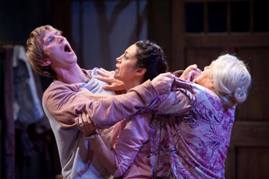 Up till now, Bill, Tami, and younger daughter Lisa (Tara Windley) have managed to find just the right “delicate balance” to keep their lives from imploding. Then comes the first visit in three years from Bill’s mother “Grammy” Sue (Karen Landry), the consequences of which might prove life-threatening, particularly since Grammy has recently broken two toes and requires a cane to get around.
Up till now, Bill, Tami, and younger daughter Lisa (Tara Windley) have managed to find just the right “delicate balance” to keep their lives from imploding. Then comes the first visit in three years from Bill’s mother “Grammy” Sue (Karen Landry), the consequences of which might prove life-threatening, particularly since Grammy has recently broken two toes and requires a cane to get around.
Playwright Jent didn’t have to do much “homework” to put Falling on paper; her own son, now nineteen, is autistic, making it no wonder that her play reveals such attention to detail.
Falling reveals how structured Tami’s daily at-home life with Josh has become. There’s the morning ritual of getting him off to school. There’s the calendar on the wall that Tami uses to prepare Josh for what’s in store today and tomorrow and the next day, and for any possible change in his day-to-day routine, take for instance Grammy Sue’s upcoming visit. Tami and Bill have worked out a system of code words to put into use when Josh seems about to lose it—“peanut butter” means Josh is starting to freak out so leave the room; “jelly” means it’s safe to come back in. (Just how necessary these code words are becomes frighteningly clear when Grammy, forgetting that she’s been told this, takes the words literally.)
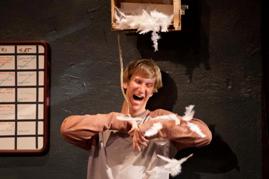 Certain scenes give us Josh at his most docile and content. (His favorite pastime seems to be standing under a box full of feathers, pulling on a string, and gleefully watching them fall, after which he returns them to the box and watches them fall again, and again, and again.) We also see just how dangerous an out-of-control six-footer can become to a mother he towers over. (The mere barking of the stray dog Lisa has brought home threatens to push him off the deep end.) And when a young man like Josh loses control, he can get violent, thereby putting the lives of those around him in significant danger.
Certain scenes give us Josh at his most docile and content. (His favorite pastime seems to be standing under a box full of feathers, pulling on a string, and gleefully watching them fall, after which he returns them to the box and watches them fall again, and again, and again.) We also see just how dangerous an out-of-control six-footer can become to a mother he towers over. (The mere barking of the stray dog Lisa has brought home threatens to push him off the deep end.) And when a young man like Josh loses control, he can get violent, thereby putting the lives of those around him in significant danger.
Playwright Dent shows us how puberty has created a whole new set of behaviors for Bill and Tami to deal with. Unable to understand the concept of “privacy,” Josh has to be told again and again not to play with his nipples (and especially not with his shirt raised) or to keep his hands out of his pants and away from his privates. “Empathy” is another concept not part of Josh’s emotional lexicon, the absence of which allows him to hurt others without any awareness that what he’s doing is wrong, at least not while he’s doing it.
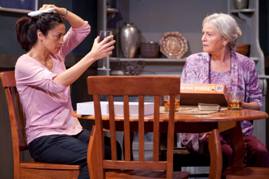 Bill and Tami have become so accustomed to these coping mechanisms that it takes Grammy’s visit to make them aware of how strange they might seem to outsiders. It must be explained to Grammy that if Josh doesn’t join his family at the dinner table the way she believes he should, it’s not because his parents don’t understand the value of a family eating supper together, it’s simply that seeing people eating “grosses him out.” And Grammy’s well-meaning suggestion that they find Josh a group home or a home care provider reveals her cluelessness to the reality faced by parents of a grown child with autism; waiting lists at group homes are a mile long, and Josh has only just recently scared off his latest helper with his unpredictability and potential for violence.
Bill and Tami have become so accustomed to these coping mechanisms that it takes Grammy’s visit to make them aware of how strange they might seem to outsiders. It must be explained to Grammy that if Josh doesn’t join his family at the dinner table the way she believes he should, it’s not because his parents don’t understand the value of a family eating supper together, it’s simply that seeing people eating “grosses him out.” And Grammy’s well-meaning suggestion that they find Josh a group home or a home care provider reveals her cluelessness to the reality faced by parents of a grown child with autism; waiting lists at group homes are a mile long, and Josh has only just recently scared off his latest helper with his unpredictability and potential for violence.
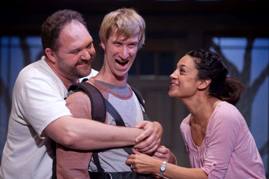 Falling lets us be flies on Bill and Tami’s walls, and if living with someone like Josh 24/7 is harrowing, even spending an hour and a quarter with him (the length of Jent’s brisk, compact play) is no walk in the park. Still, tough as it may be to witness lives lived in precarious proximity to a young man like Josh, Falling makes for gripping drama (with just enough laughs to ease the tension).
Falling lets us be flies on Bill and Tami’s walls, and if living with someone like Josh 24/7 is harrowing, even spending an hour and a quarter with him (the length of Jent’s brisk, compact play) is no walk in the park. Still, tough as it may be to witness lives lived in precarious proximity to a young man like Josh, Falling makes for gripping drama (with just enough laughs to ease the tension).
Jent does go out on a limb about three-quarters into Falling, a move that may alienate certain theatergoers who might feel she’s gone too far off the deep end. I liked this unexpected twist, accepted it, and felt that it gave Falling a resolution that it might otherwise not have had. At the very least, it provides ample food for discussion once the final feathers have fallen.
Under Elina de Santos’s sensitive, incisive direction, her cast of five deliver one impressive performance after another.
 Just as he did in last season’s A Bright New Boise, Elkin does powerful, moving work as Bill, a husband whose marriage is being sorely tested by his wife’s obsessive devotion to the son they both love.
Just as he did in last season’s A Bright New Boise, Elkin does powerful, moving work as Bill, a husband whose marriage is being sorely tested by his wife’s obsessive devotion to the son they both love.
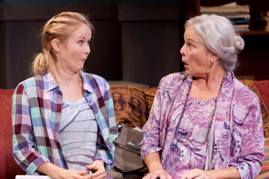 Windley simply could not be better as Lisa, whose way of dealing with Josh is to ignore him, even as she longs for escape from a home where nothing revolves around her. Though two years out of college, the young actress (so memorable in Rogue Machine’s Bhutan) once again easily passes as fifteen or thereabouts, yet gives Lisa layers that an actual teenager might not.
Windley simply could not be better as Lisa, whose way of dealing with Josh is to ignore him, even as she longs for escape from a home where nothing revolves around her. Though two years out of college, the young actress (so memorable in Rogue Machine’s Bhutan) once again easily passes as fifteen or thereabouts, yet gives Lisa layers that an actual teenager might not.
Landry captures to perfection a woman whose faith may prove an irritant to a daughter-in-law who lost her own faith long ago, but is utterly sincere in her belief that God will find an answer to her family’s prayers.
Still, splendid as these three performances are, the evening belongs to Khaja and Little as a mother and son locked in a codependent relationship for which there seems to be no relief in sight.
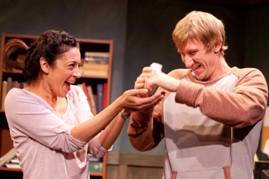 Los Angeles theatergoers know Khaja from her two Best Solo Performance Scenie wins—in Shaheed: The Dream And Death Of Benazir Bhutto and in No Word In Guyanese For Me, both of which had Khaja embodying half-a-dozen or more characters. Falling gives her other actors to play off of, and she is absolutely superb—and heartbreaking—as a woman whose sunny smile is pasted on to hide a heart and soul at the breaking point. Add to that as physically exhausting a role as Khaja has likely undertaken, and you’ve got another unforgettable performance from one of L.A.’s most gifted actresses.
Los Angeles theatergoers know Khaja from her two Best Solo Performance Scenie wins—in Shaheed: The Dream And Death Of Benazir Bhutto and in No Word In Guyanese For Me, both of which had Khaja embodying half-a-dozen or more characters. Falling gives her other actors to play off of, and she is absolutely superb—and heartbreaking—as a woman whose sunny smile is pasted on to hide a heart and soul at the breaking point. Add to that as physically exhausting a role as Khaja has likely undertaken, and you’ve got another unforgettable performance from one of L.A.’s most gifted actresses.
And then there is Little, who so vanishes into Josh’s awkward body (misshapen by baggy clothes and what appear to be adult diapers under his shapeless slacks) that it seems hard to believe this is the same actor who played one of a quartet of shirtless tattooed muscle-hunk bullies in House Of Gold a couple of years back. Embodying a character with disabilities may be a sure bet for award consideration when done well, but Little does more than just play a character with a neurological difference; he invests Josh with a heady combination of brutishness and tenderness that justifies each family member’s feelings, whether as negative as Lisa’s, as unconditionally loving as Tami’s, or as smack dab in the middle as Bill’s.
As always, Rogue Machine’s team of designers give Falling a top-drawer look and feel. Resident scenic designer Stephanie Kerley Schwarts has created a finely detailed family home (the leafless tree backdrop is a particularly nice touch, echoed in Leigh Allen’s superb lighting), a living-dining area which properties designer Sharron Shayne has appointed with all the paraphernalia you’d find in a home like Josh’s. Elizabeth A. Cox’s character-appropriate costumes and Christopher Moscatiello’s accomplished sound design are winners too, with fight director Joe Sofranko making Josh’s violent outbursts frighteningly real.
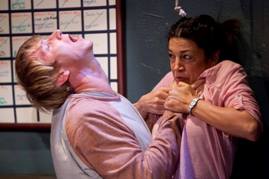 Falling is produced by John Perrin Flynn and Diane Alayne Baker. Julia Doolittle is assistant director. Amanda Mauer is production manager and David Mauer technical director. Ramón Valdez is stage manager.
Falling is produced by John Perrin Flynn and Diane Alayne Baker. Julia Doolittle is assistant director. Amanda Mauer is production manager and David Mauer technical director. Ramón Valdez is stage manager.
Deanna Jent’s Falling makes for a fascinating companion piece to Ken LaZebnik’s On The Spectrum, which played at The Fountain earlier this year. Both deal with young adult men “on the spectrum” of autism. Program notes for Falling explain that “if you meet one person with autism, you’ve met one person with autism.” Thanks to two talented playwrights and two of our finest theater companies, I have now gotten to meet more than just one, and am all the richer for having made their acquaintance.
Rogue Machine, 5041 Pico Blvd, Los Angeles.
www.roguemachinetheatre.com
–Steven Stanley
November 3, 2013
Photos: John Flynn
Tags: Autism, Deanna Jent, Los Angeles Theater Review, Rogue Machine Theatre


 Since 2007, Steven Stanley's StageSceneLA.com has spotlighted the best in Southern California theater via reviews, interviews, and its annual StageSceneLA Scenies.
Since 2007, Steven Stanley's StageSceneLA.com has spotlighted the best in Southern California theater via reviews, interviews, and its annual StageSceneLA Scenies.







 COPYRIGHT 2025 STEVEN STANLEY :: DESIGN BY
COPYRIGHT 2025 STEVEN STANLEY :: DESIGN BY